Turf Selection
What seed should you get, warm season vs cool season, and why it should matter to you.
What seed should you get, warm season vs cool season, and why it should matter to you.
Cool Season versus Warm Season: Do you want Green Grass year round? If the answer is
YES, then you want a cool season grass and you need to live in Western NC
or maybe central NC. Cool season grasses thrive in temp's at around 60-70 degrees, anything warmer and they begin to go dormant or die.
Deciding what turf you want is a big decision, we recommend looking at yards in your neighborhood and identifying what you want. Another part of determining what turf to select is asking yourself how much time are you willing to spend on it? Centipede is a low maintenance turf that should have weed control And disease control done, perhaps pest control… and
MINIMAL
Fertilization (.5 lbs to 1 lbs of Nitrogen per year). Bermuda is a fast growing (and recovering) turf that requires frequent mowing, plenty of Nitrogen (up to 1 lbs of nitrogen per month per 1000 SF), and liming (adjusting the Ph) at least once a year (+) disease, pest, and weed control/prevention. Zoysia is a thick turf that may require a reel mower to be effective; however, the variety of Zoysia you select may eliminate this requirement (other maintenance requirements are the same as Bermuda).
Not discussed here are erosion control grasses and seeding options, or cool season grasses. We focus our service on Eastern North Carolina, but we will provide services state wide if the job is large enough. Typically erosion control jobs will specify the seed mixture to use, and for Central-Western NC your seed selection will normally be a Fescue, Blue Grass, or other cool season grass or blend. For additional info on turf selection, we recommend visiting the NC State Turf Files.
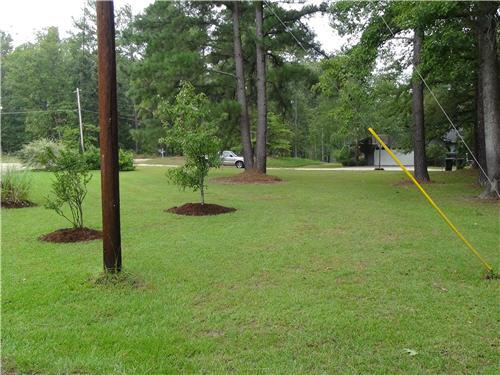 Centipede
Centipede
Centipede is a slow-growing, coarse-textured, warm-season turf that is adapted for use in low maintenance situations. It is often referred to as "lazy man's grass" due to its infrequent mowing and fertilization requirements. It has a light-green color and spreads by stolon's (above ground runners). It does not tolerate high traffic (sports), compaction, high pH, or shade.
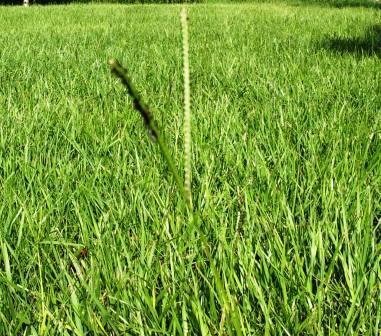 Bahia
Bahia
Bahia grass is hardy turf grass;a warm-season species that spreads by rhizomes, and is easily recognized by its characteristic "Y-shaped" seed head. It exhibits low overall quality because of its light color, coarse texture, and open canopy. Due to its rapid lateral spread via aggressive rhizome production it is primarily used in areas where erosion control and immediate ground cover are the main concern. It is frequently planted on roadsides and highway rights of way because it has good drought tolerance. In addition, Bahia has the ability to tolerate a wide range of soils.
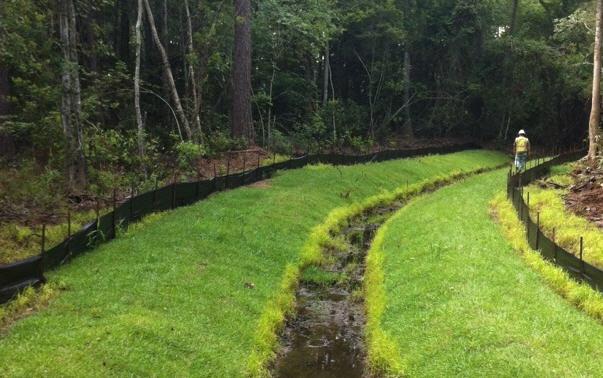 Common Bermuda
Common Bermuda
Common Bermuda has two versions of seed (hulled and unhulled). Hulled seeds (typically planted in the spring – summer) have the seed husk removed and germinate faster while unhulled still have a natural seed husk that generally delays germination (typically planted in the fall and winter). This delay is natures way of waiting for more ideal conditions and ensuring a species survival. Under good growing conditions hulled seed will create a faster established lawn. Coated seed have a special chemical coating applied that helps in germination and reduces loss to birds. Common Bermuda is the roughest of the Bermuda turfs in texture and typically used in erosion control jobs vs residential installations. All Bermuda grasses spread by rhizomes (underground runners) and stolon's (above ground runners).
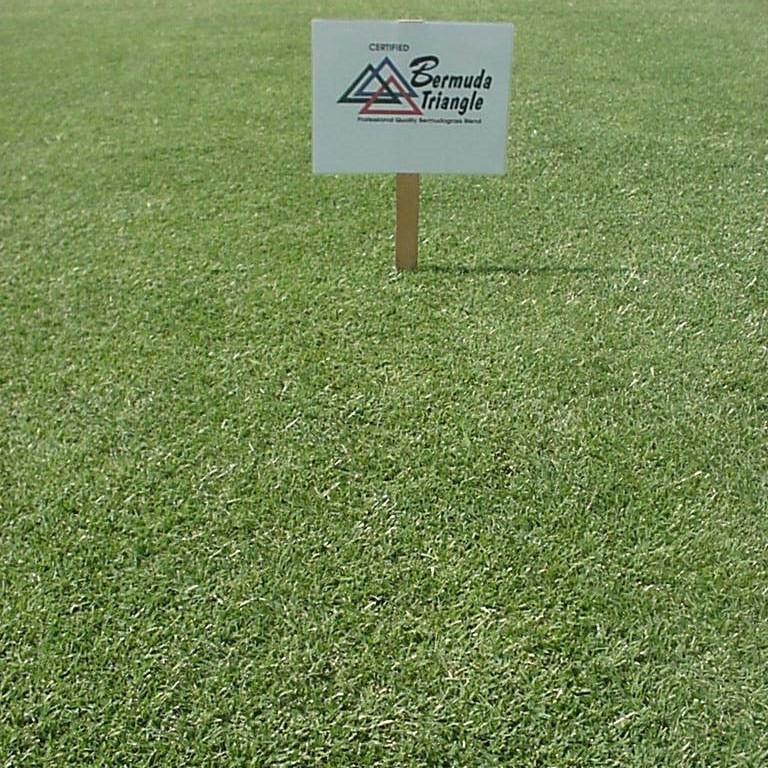 Bermuda Triangle
Bermuda Triangle
Three Bermuda seed varieties have been blended together to provide an excellent turf with wide adaptation. These top performing varieties have improved turf density, color and moderate cold tolerance. This a good choice for a good lawn that recovers from injury fast, can withstand sports traffic, and still look nice in residential setting. The blend of Bermuda varieties allows the best of the varieties (drought resistance, wear, color, etc to give you a hardy blended turf).
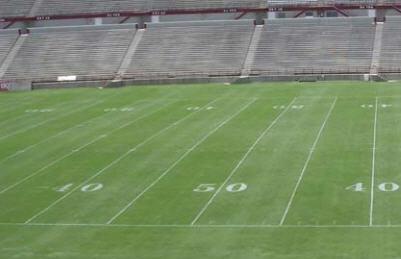 Princess 77
Princess 77
Princess 77 Bermuda: The premium seeded variety of Bermuda. It's the first dense, fine-textured hybrid Bermuda variety to be available in seeded form. Princess 77 seed is the first seeded Bermuda that is competitive with vegetative hybrid Bermuda (sod or sprig installations only) for turf grass quality, leaf texture, color, and density. Characteristics include outstanding drought tolerance (requires 21% less water than Tifway), dark green color, medium fine leaf texture, and high leaf density (thick).
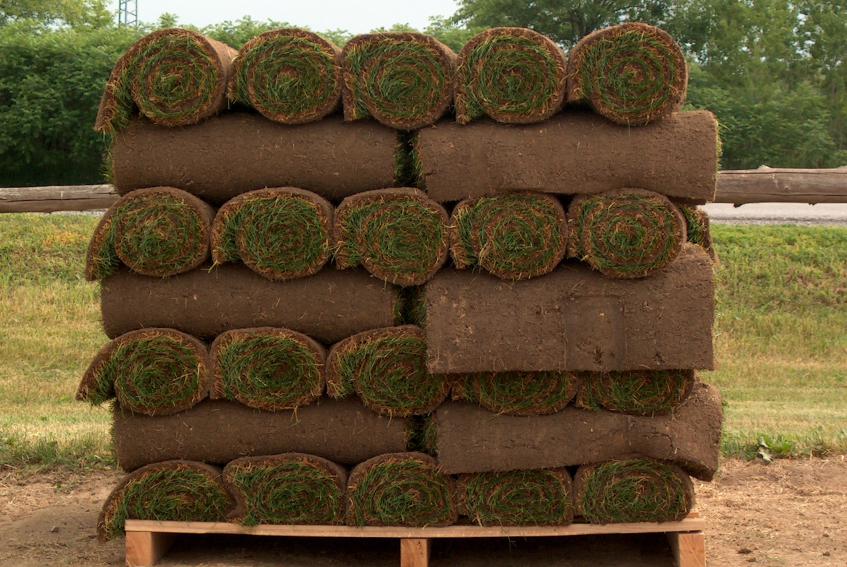 Hybrid Bermuda
Hybrid Bermuda
Bermuda grass is the most widely used species on athletic fields and golf course fairways/tee boxes due to its high wear tolerance and rapid recovery. Hybrid Bermuda is a genetically "cloned" turf that ensures that the entire yard has a uniform texture and color. This process restricts the installation to either sod or a sprig installation. There are several varieties of hybrid Bermuda's, each having its own benefits. We only provide hybrid Bermuda as a sprig installation, TYPICALLY 1 ACRE OR LARGER.
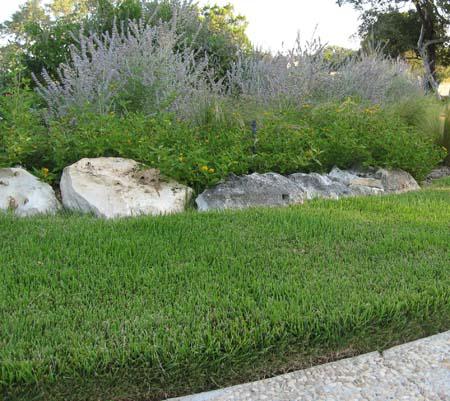 Zoysia
Zoysia
Like Bermuda, Zoysia spreads by rhizomes (underground runners)and stolon's (above ground runners) and produces a dense, wear-resistant turf. Zoysia can be confused with Bermuda. However, is stiff to the touch and offers more resistance than Bermuda. Like Bermuda there are varieties that can be seeded and others that must be sprigged or sodded. (Moderate Shade Tolerance)
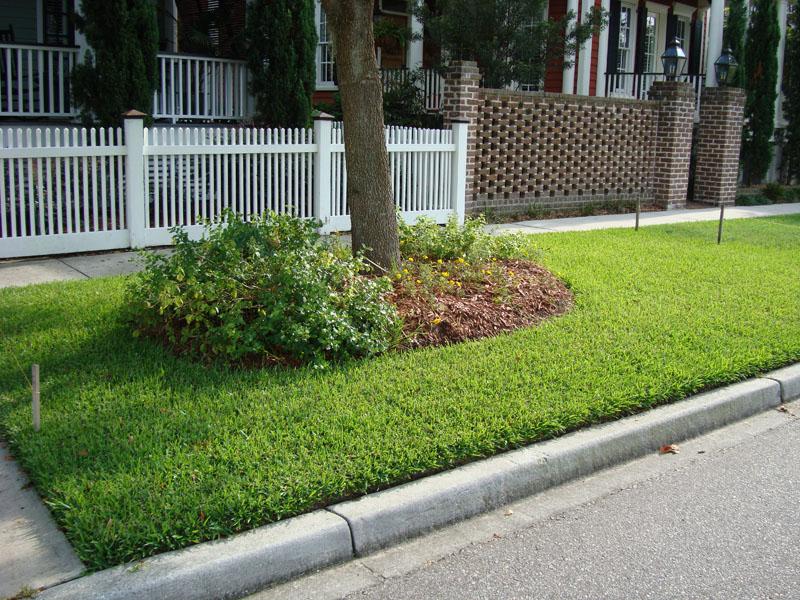 St Augustine
St Augustine
St. Augustine is a warm-season species that spreads by stolon's (above ground runners). It has very coarse texture, an open canopy, and is most commonly found in coastal areas due to its preference for warm climates and sandy soils. It is used for home lawns and utility turf, but its lack of cold tolerance restricts its use primarily to the coastal plain. St. Augustine can only be sodded or plugged; we do not offer St. Augustine. St. Augustine is susceptible to chinch bugs and should be managed to ensure that these insects do not destroy your yard in a week! (Moderate Shade Tolerance)
Large sites will save thousands of dollars over sod, and the additional cost (if any) over straw is made up on the reduces potential of sheet erosion and improved turf survival and establishment rates.